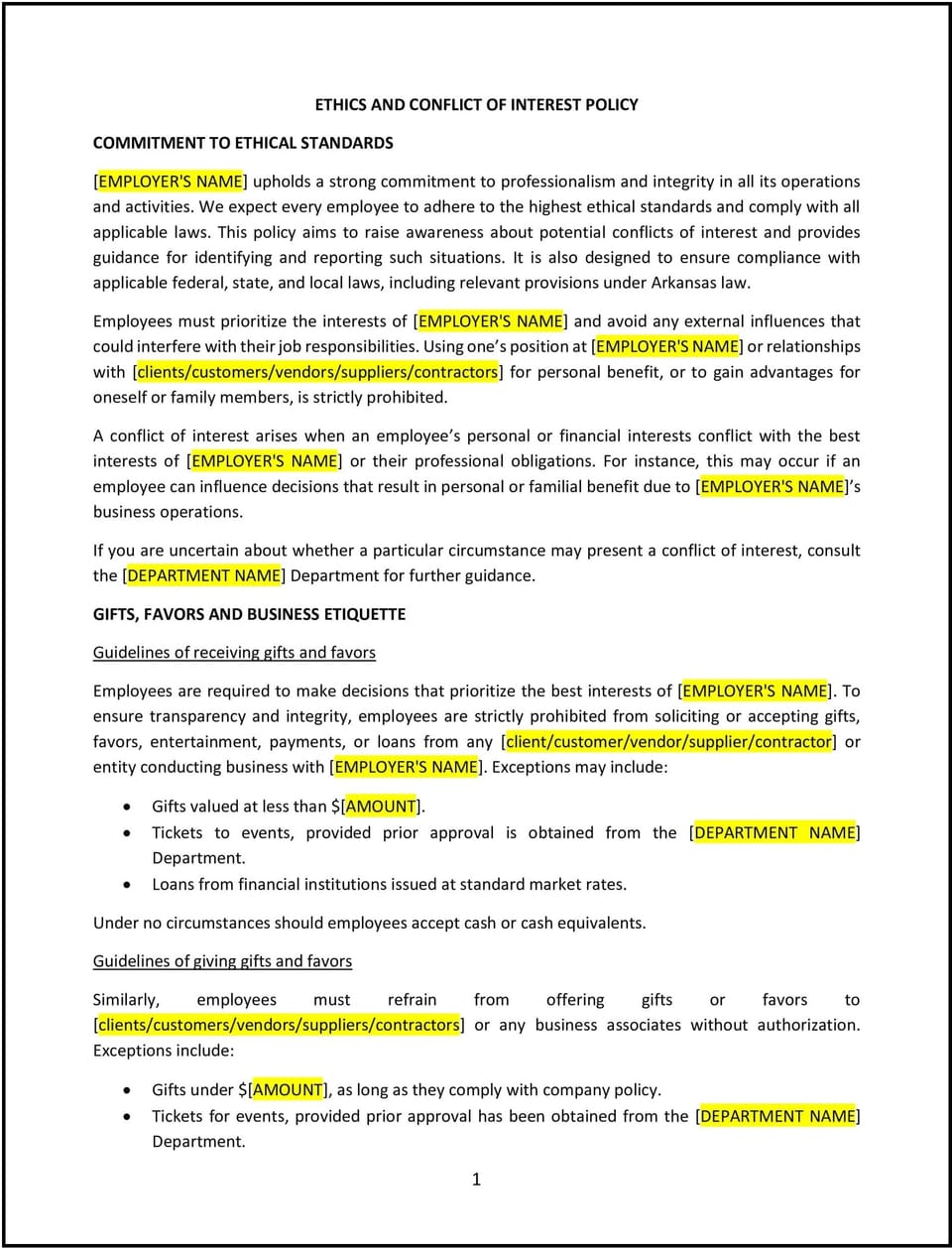Ethics and conflict of interest policy (Arkansas): Free template

Ethics and conflict of interest policy (Arkansas)
In Arkansas, an ethics and conflict of interest policy provides businesses with clear guidelines to promote ethical behavior and manage potential conflicts of interest in the workplace. This policy establishes expectations for employee conduct, defines conflicts of interest, and outlines procedures for addressing ethical concerns.
This policy helps businesses maintain integrity, protect their reputation, and ensure compliance with state and federal regulations. By implementing this policy, Arkansas businesses can foster a culture of transparency and accountability.
How to use this ethics and conflict of interest policy (Arkansas)
- Define ethical standards: Clearly outline the values and behaviors the business expects from employees, such as honesty, fairness, and compliance with laws.
- Identify conflicts of interest: Provide examples of situations that may create conflicts, such as financial interests, outside employment, or personal relationships affecting business decisions.
- Establish disclosure procedures: Require employees to disclose potential conflicts of interest to management or HR, following a clear and confidential process.
- Address violations: Specify the consequences for unethical behavior or undisclosed conflicts, including disciplinary actions up to termination.
- Promote training and awareness: Provide regular training on ethical practices and conflict of interest management to ensure employees understand and adhere to the policy.
Benefits of using this ethics and conflict of interest policy (Arkansas)
This policy offers several advantages for Arkansas businesses:
- Protects business integrity: Promotes ethical behavior, safeguarding the business’s reputation and stakeholder trust.
- Supports compliance: Ensures alignment with Arkansas laws and federal regulations, reducing the risk of legal issues or penalties.
- Reduces conflicts: Establishes clear guidelines for managing potential conflicts of interest, minimizing workplace disputes or bias.
- Enhances decision-making: Encourages transparency and accountability, leading to more ethical and sound business decisions.
- Builds employee trust: Demonstrates the business’s commitment to fairness and ethical practices, fostering a positive workplace culture.
Tips for using this ethics and conflict of interest policy (Arkansas)
- Address Arkansas-specific considerations: Include any state-specific legal or regulatory requirements related to ethical conduct or conflicts of interest.
- Regularly review disclosures: Implement a system to review and address disclosed conflicts of interest promptly and fairly.
- Train managers: Provide training to supervisors on recognizing and addressing potential conflicts of interest or unethical behavior.
- Encourage reporting: Create an open environment where employees feel safe reporting ethical concerns or conflicts without fear of retaliation.
- Update periodically: Review and update the policy to reflect changes in regulations, business practices, or emerging ethical concerns.
Q: How does this policy benefit the business?
A: This policy ensures ethical practices, protects the business’s reputation, minimizes risks of conflicts affecting decision-making, and supports compliance with Arkansas laws, fostering a trustworthy and transparent work environment.
Q: What are common examples of conflicts of interest?
A: Examples include employees having financial stakes in vendors or competitors, personal relationships that influence business decisions, or outside employment that creates a conflict with business responsibilities.
Q: How does this policy support compliance with Arkansas laws?
A: The policy aligns with Arkansas-specific regulations and federal laws, ensuring the business adheres to legal requirements for ethical conduct and conflict management.
Q: What should the business do when a conflict of interest is disclosed?
A: The business should review the disclosure, evaluate its potential impact, and take steps to mitigate risks, such as reassigning tasks or requiring the employee to divest conflicting interests.
Q: How can the business encourage employees to report ethical concerns?
A: The business can foster a safe reporting environment by offering anonymous reporting channels, ensuring confidentiality, and protecting employees from retaliation.
This article contains general legal information and does not contain legal advice. Cobrief is not a law firm or a substitute for an attorney or law firm. The law is complex and changes often. For legal advice, please ask a lawyer.


